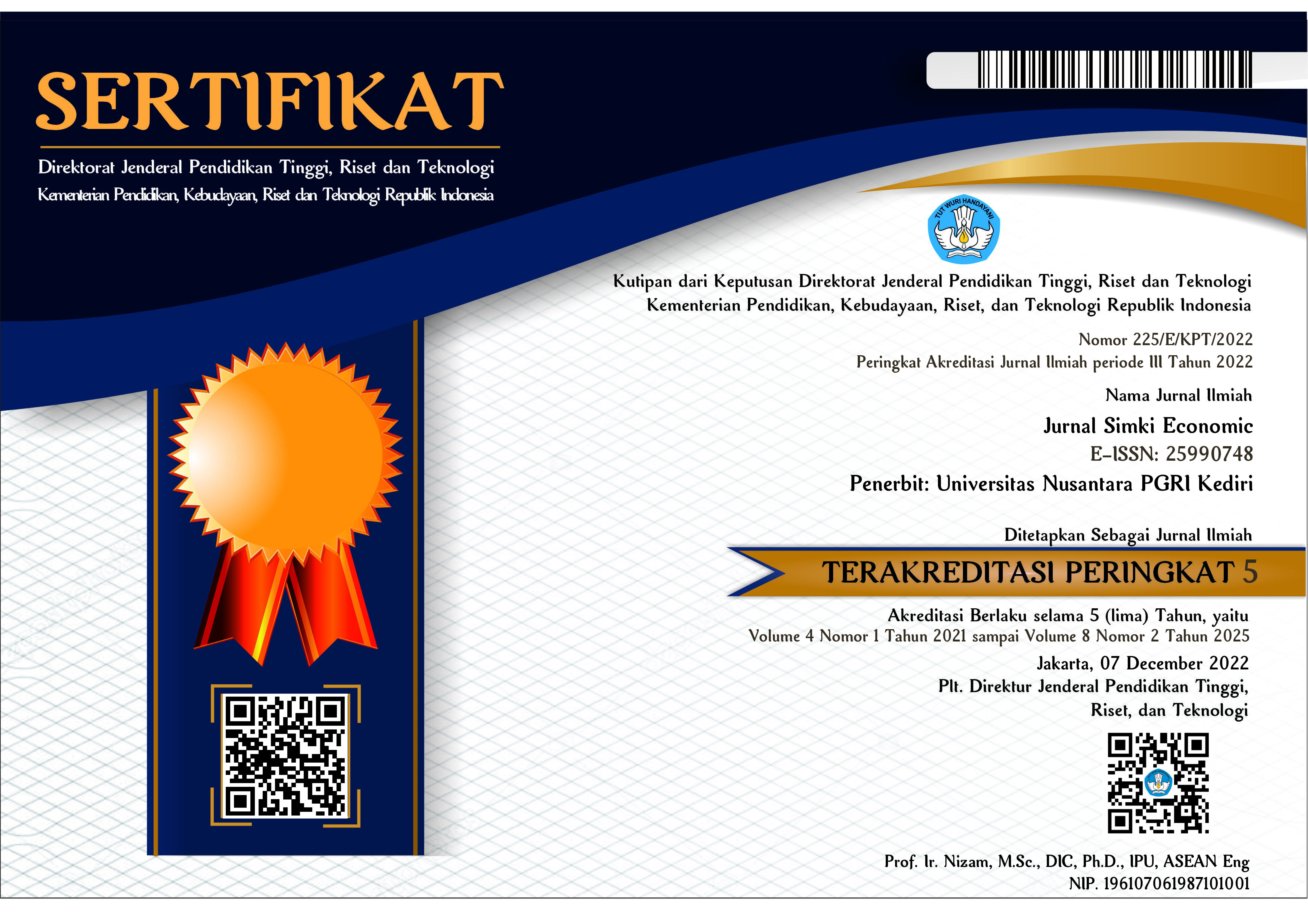Mengungkap Hubungan Sikap Kerja Karyawan Terhadap Kinerja Melalui Variabel Mediasi Employee Engagement
 Abstract views: 786
,
Abstract views: 786
,
 PDF (Bahasa Indonesia) downloads: 1096
PDF (Bahasa Indonesia) downloads: 1096
Abstract
The objective of this study is to evaluate how much influence work attitude has on performance, both partially and simultaneously. The basis for analyzing data using SEM-PLS as a calculating tool to analyze the outer and inner models is quantitative methods and correlational designs. Purposive sampling generated a total of 73 respondents. The outcome is that 1) work attitude, precisely employee craftsmanship, has a significant effect on employee engagement; 2) employee engagement, precisely employees feeling comfortable developing a career, has a substantial effect on performance; 3) work attitude, precisely employee craftsmanship, has a substantial effect on performance; and 4) work attitude has a moderate effect on performance through employee engagement. The novelty is employees who are diligent (work attitude), comfortable developing careers (employee engagement), and leaders who appreciate work (performance) are alternative offers to optimize employee capabilities in the workplace.
Downloads
References
Abun, D., Luciano, A., Ubasa, A., Magallanes, T., Encarnacion, M. J., & Ranay, F. B. (2021). Attitude toward the work and its influence on the Individual work performance of employees: Basis for Attitude Management. Technium Social Sciences Journal, 17, 235–243. https://techniumscience.com/index.php/socialsciences/article/view/2966
Allameh, S. M., Shahriari, M., & Mansoori, H. (2012). Investigating employee’s attitude toward organization, organizational climate and employee’s engagement as antecedents of organizational citizenship behavior. Australian Journal of Basic and Applied Sciences, 6(8), 384–393. http://www.ajbasweb.com/old/ajbas/2012/August/384-393.pdf
Asumeng, M., & Assan, E. (2015). What It Means to Work Hard for Career Progression: A Study of Corporate Managers in Ghana. British Journal of Psychology Research, 3(2), 19–34. https://www.eajournals.org/journals/british-journal-of-psychology-research-bjpr/vol-3issue-2-june-2015/what-it-means-to-work-hard-for-career-progression-a-study-of-corporate-managers-in-ghana/
Bernardin, H. J., & Russel, J. E. A. (2013). Human Resources Manajement. Mc GrawHill. Inc.
Corgnet, B., Gonzalez, R. H., & Mateo, R. (2015). Cognitive reflection and the diligent worker: An experimental study of millennial. PLoS ONE, 10(11), 1–13. https://doi.org/10.1371/journal.pone.0141243
ENGAGEMENT MULTIPLIER. (2021). Why is Employee Engagement So Important? ENGAGEMENT MULTIPLIER. https://www.engagementmultiplier.com/resources/why-is-employee-engagement-so-important/
Ferinia, R., & Hutagalung, S. (2017). Linkage Between McClelland Motivation Theory, Interpersonal Relationship, Employee Engagement and Performance of Nurses at Adventist Hospital. Advanced Science Letters, 23(11), 10955. https://doi.org/https://doi.org/10.1166/asl.2017.10196
Hallberg, U. E., & Schaufeli, W. B. (2006). Same same’ but different? Can work engagement be discriminated from job involvement and organizational commitment. European Psychologist, 11, 119–127. http://dx.doi.org/10.1027/1016-9040.11.2.119
Himawaty, R., & Widodo. (2022). Peran Employee Engagement Terhadap Employee Performance. Jwm (Jurnal Wawasan Manajemen), 10(3), 167–177. https://doi.org/10.20527/jwm.v10i3.221
Holbeche, L & Matthews, G. (2012). Engaged. USA:John Wiley & Sons, Inc.
Lukito, H., & Utama, M. K. (2019). Pengaruh Absenteeism Dan Job Attitude Terhadap Kinerja Karyawan Pada Perusahaan Leasing Di Kota Padang. Bisma, 13(3), 139. https://doi.org/10.19184/bisma.v13i3.8879
Muliawan, Y., Perizade, B., & Cahyadi, A. (2017). PENGARUH KETERIKATAN KARYAWAN (EMPLOYEE ENGAGEMENT) TERHADAP KINERJA KARYAWAN DI PT. BADJA BARU PALEMBANG. Jurnal Ilmiah Manajemen Bisnis Dan Terapan Tahun XIV No 2, Oktober 2017, 2, 69–78. https://doi.org/10.29259/jmbt.v14i2.5293
Robbins, S.P., & J. (2018). Essential Organizational Behavior (14th ed.). Pearson Education Limited.
Robbins, S.P., & Judge, T. A. (2013). Organizational Behavior (15th ed.). Pearson.
Robertson, I. T., Jansen, A., & Cary, B. (2012). Article information :Job and work attitudes, engagement and employee performance. Leadership & Organization Development Journal, 33(3), 224–232.
Schaufeli, W. B., & Bakker, A. B. (2004). Job demands, job resources, and their relationship with burnout and engagement: A multi-sample study. Journal of Organizational Behavior, 25(3), 293–315. https://doi.org/10.1002/job.248
Stocker, D., Jacobshagen, N., Krings, R., Pfister, I. B., & Semmer, N. K. (2014). Appreciative leadership and employee well-being in everyday working life. Zeitschrift Fur Personalforschung, 28(1–2), 73–95. https://doi.org/10.1688/ZfP-2014-01-Stocker
Stroh, L. K., Northcraft, G. B., & Nealie, M. A. (2002). Organizational Behavior (3rd ed.). New Jersey: Lawrence Erlbaum Associates.
Sudarmanto, E., Kurniullah, A. Z., Revida, E., Ferinia, R., Butarbutar, M., Abdilah, L. A., Sudarso, A., Purba, B., Purba, S., Yuniwati, I., Hidayatulloh, A. N., HM, I., & Suyuthi, N. F. (2021). Desain Penelitian Bisnis: Pendekatan Kuantitatif. Medan: Yayasan Kita Menulis.
Wu, S., Kee, D. M. H., Li, D., & Ni, D. (2021). Thanks for Your Recognition, Boss! a Study of How and When Voice Endorsement Promotes Job Performance and Voice. Frontiers in Psychology, 12(July), 1–10. https://doi.org/10.3389/fpsyg.2021.706501
Yakup, Y. (2017). Pengaruh Keterlibatan Kerja, Budaya Organisasi dan Motivasi Kerja terhadap Kepuasan Kerja Pegawai. Perisai : Islamic Banking and Finance Journal, 1(3), 273–290. https://doi.org/10.21070/perisai.v1i3.1112
Zammitti, A., Russo, A., Magnano, P., & Guarnera, M. (2022). Work Engagement as a Moderating Factor between Positive Attitude toward Smart Working and Job and Life Satisfaction. European Journal of Investigation in Health, Psychology and Education, 12(7), 781–791. https://doi.org/10.3390/ejihpe12070057
Copyright (c) 2023 Adila, Rolyana Ferinia Pintauli

This work is licensed under a Creative Commons Attribution 4.0 International License.














